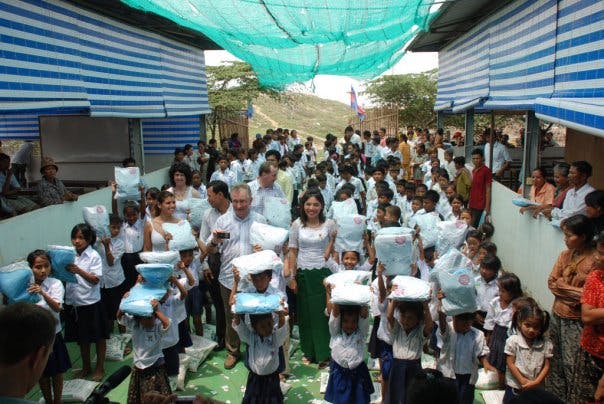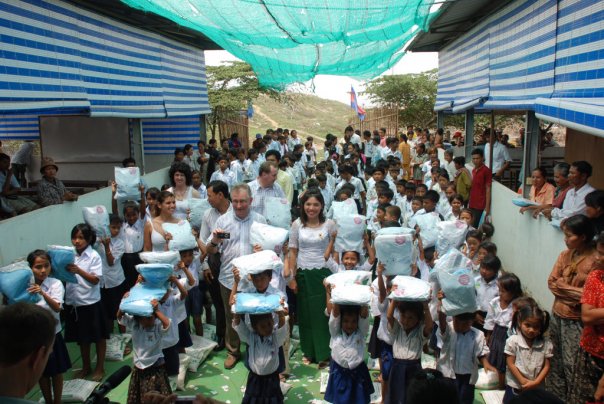How to develop a country without Education!
Jan 21, 2015
Story


When I first began writing my final VOF assignment, I thought I would focus on education, because education has been the key to lifting myself out of poverty. But as I started looking at education I realized that it is only part of a whole series of problems that Cambodia faces, all of them interlinked and threatening to derail the country's recovery from 30 years of genocide, civil war, and economic stagnation. As part of my preparation for the final assignment, I planned to interview all kinds of experts and educators about how to improve education in Cambodia. Then I met Tan Eng, a young woman employed as a sex worker in Phnom Penh's notorious Blue Lounge. As she told the story of how she came to be in this line of work, I recognized that she was just one small symptom of a bigger disease that ails my country.
Tan Eng, 22, comes from Prey Veng Province, also known as “grand” or “long” forest, in the eastern part of Cambodia. It is a poor rural area where 53% of the population lives under the poverty line compared to 36% nation wide. Because of the lack of jobs, many young people migrate to larger cities or neighboring countries to seek employment. This makes them vulnerable to trafficking and sexual/labor exploitation. In addition, those younger children or siblings who remain in the villages are in high demand for child labor, as almost all families are involved in subsistence agriculture. When children are put to work, they tend not to attend school, thus perpetuating illiteracy or under-education for another generation.
Tan Eng moved into the apartment block where I live. We first met at a grocery store near our houses and realized that we were neighbors. She lives in a small rented room at the front of my building. She was reluctant to talk much about herself, initially, but as we got to know one another, she revealed what she did for a living. When I told her about the article I was writing, she agreed to be interviewed in the hopes that her story would help increase awareness about the conditions that caused her to take this path.
On the day we met for the interview Tan Eng seemed sad, and as we began talking, she described symptoms of depression and told me that she suffered from guilt and shame, as well as a well-founded fear of contracting the HIV virus. She described how she 'goes away in her mind' when having sex with a client and said she feels that her soul has left her body. “I would not have sold my body if my family had had enough food to eat or education”, she said sadly. “What I am doing now is so I can help my brother and sisters to study and to help with living expenses.”
As sad as Tan Eng's story is, what's even worse is that there are thousands of other girls just like her, girls who are either forced into the sex trade, trafficked to other countries, or fall into it because they have no education and it is the most they can hope to earn, having no other marketable skills. To understand why so many girls - and also boys and adult men and women - find themselves in such dire situations, one needs to understand the economic and psychological roots of Cambodia's dysfunction.
Cambodia is known as one of the world’s poorest countries. According to the UNDP Human Development Index Report, in 2004 Cambodia ranked 130 out of 177 countries. Annual per capita income was $256 in 1999. While so many Asian countries have prospered since then, Cambodia’s per capita income has risen to just $300 today, a virtual economic standstill. Approximately 36% of the population lives below the basic needs poverty line, with the poverty rate in the rural areas at 40%, four times as high as Phnom Penh, where it is only 10%. This imbalance between the countryside and the capital helps explain why someone like Tan Eng would try her luck in the big city: the alternative – staying in her village – means almost certain poverty and deprivation.
Cambodia’s achievements in education in the 1960s and early 1970s were systematically erased by the Khmer Rouge in the second half of the 1970s, when schools, equipment, and books were destroyed, effectively abolishing education. It is estimated that 75-80 percent of all teachers and secondary school students fled or were murdered from 1975-79. Overall, the Khmer Rouge regime was responsible for the deaths of approximately 1.7 million people by execution, starvation and forced labor. The economic and psychological toll of this genocide has yet to be calculated.
Thirty years after the genocide, its impact is still felt as families continue trying to make sense of what was lost to Pol Pot’s madness – loved ones, of course, but also an entire way of life, a sense of cultural continuity and belonging; the bonds that create a cohesive, functional society. I decided to revisit the Toul Sleng (Genocide) Museum. The first time I visited I remember feeling shocked – the images of violence seemed so recent and brought to life all the stories my parents had told me about the deprivation, violence and horror of those years.
I met a woman who was selling Cambodian history books there, and I asked her how she feels when she hears the name Pol Pot. Chan Sophal is 47 years old, so she was in her teens during the late 1970s. “I feel so much regret and anger with Pol Pot – I am sad about losing my family and also because of the torture and suffering they endured before they died” she said. Today she sees her mission as educating the world about what happened. “Even though my memories are painful, I am happy to bring all these books to sell here because so many tourists come to visit this museum, and they are really interested and eager to know about what happened.”
Many Cambodians, including my parents, have adopted a philosophical attitude about the past. Of course they remember what happened, but they try not to pass the sadness, anger and resentment to the next generation. My parents, for instance, told me that they did not want me to be sad or try to seek revenge for the family members we lost. Like so many, they are looking to the future, and I benefitted from their attitude, because they made it possible for me to go to college, despite their limited means. Tan Eng was not so lucky.
Post-Khmer Rouge, Cambodia has made an enormous effort to expand schooling. There has been a concerted effort to rebuild the education infrastructure, but this had to be done under tight budgetary constraints. This means that illiteracy continues to plague the country. Half of the rural population does not have a primary school in the village and more than 95 percent have no secondary school. Often a family can only afford to send one or two children to school. The others, like Tan Eng, have to work or take care of their siblings, sometimes both.
This combination of poverty and illiteracy is the main driver behind the phenomenon of human trafficking of Cambodian men, women and children to more prosperous neighboring countries like Thailand, Taiwan, Hong Kong,Vietnam, and even within Cambodia. Men are trafficked for forced labor in the agriculture, fishing, and construction industries. Women are trafficked for sexual exploitation and forced labor in factories or as domestic servants. Children are trafficked for sexual exploitation and forced labor in organized begging rings, soliciting, street vending, and flower selling. Their poor literacy makes them even more dependent on their “employers”, and many can see no way to liberate themselves from their appalling situations.
Interestingly, Cambodia’s Ministry of Social Affairs and Youth Rehabilitation found that 76 percent of trafficked persons returning from Thailand had come from families who owned land; 93 percent from families that owned their own house and had no debt on the land or house; and 47 percent stated that their mother was the facilitator of their trafficking.
These statistics seem to indicate that families themselves are complicit in the cycle of human trafficking. Again, illiteracy plays a role. Poorly educated families, especially those in financial straits, desperately trying to hang on to their land or home, are easy prey for the “employment agents” who come by their villages making grand promises of well-paying jobs abroad.
The global economic crisis has also contributed to trafficking. Cambodia’s economy was growing at a respectable 10 per cent annual pace between 2004 and 2007. As the impact of the crisis spread across the globe, Cambodia’s growth slowed to 6.7 per cent in 2008 and even lower in 2009. This caused tens of thousands of people to lose their jobs, particularly in key sectors such as the garment industry, tourism, and construction, creating a huge pool of unemployed workers susceptible to trafficking and the lure of prostitution.
For example, Tan Eng told me that as a housemaid, she could earn about 200,000 Riel which is US$ 50 per month. At the Blue Lounge she makes $100 plus $3-5 per customer, giving her a monthly income that is enough to cover food and school fees for her siblings.
The Cambodian government has responded to the crisis with a stimulus package targeted to boost spending on infrastructure, social programs and agriculture. In addition a tourism policy taskforce was recreated, with the aim of upgrading the industry and attracting more regional tourists. But even as an economic recovery seems to be underway, the damage has already been done for too many young women like Tan Eng.
There are some rays of hope, however. A number of NGOs are involved in efforts to bring schools and education to Cambodia’s neediest children. One of them is PIO – People Improvement Organization. Phymean Noun, 40, a Founder and Executive Director of PIO is a 2008 recipient of the CNN Heroes award. Her organization has set up tuition-free schools for the poorest of the poor, serving more than 10,000 children since 2004.
“My life is connected to those children who need help,” Ms. Phymean says. “No child should have to work on the garbage dump and sleep in the street. There is no greater joy for me than to see a child who once spent her days picking through rubbish looking happy, enjoying herself, learning to read and write and smiling with hope for the future.”
Come back to Tan Eng’s life, she is now having a belly ache as she has tried to drink beer every night she goes to work to serve her guests. I asked her why she didn’t try to drink it and she immediately replied me “Oh it is really impossible for the work as mine because if I had not drunk so they would not have given me money then how can I raise and help my family?” she is an oldest sister in her family – 3 sisters and 1 brother. I can imagine how hard to live in this world without education, Eng is a strong lady as even she has been driven to sex work but she always hopes to educate her siblings out of this field. She made me remember my past when my parents fought the barriers to send me to school to get education. Our lives are tough because of living in poverty so it is our obstacle to get education though.
While I was talking to her, I saw her eyes were so red showing me her life is struggling to live in this cyber world where only a darkness place for her life is. She told me she wanted to learn a skill such as cooking, beauty or tailoring skill but her siblings are so small “they can’t study if I quit my job now so it is only job that can help my family to recover our lives,” she added, “I don’t care about myself but I do hope I can help my siblings to get hi¬gh education and parents to live a better live.”
Her sisters are Thida, 20, studies grade 12; Theara, 19, studies grade 10; Theary, 17, grade 8 and her youngest brother is Bora, 15, is a fabulous student and has also been offered a 12 years scholarship from Beltie International School in Cambodia, a famous and expensive among privates schools in Cambodia. I think it is a good thing that Eng has tried and fought the obstacle to help their siblings go to school and I also understand that it is what she keeps working her current job just because she had never thought to recover her life now but she has only given her dream to her little sisters and brothers to have better lives in society. Her parents are at homeland planting vegetable to sell at the market, they can earn only 2,000 -3,000 Riel which is around 0.70$ per day.
Access to education is a way to build a strong society. Education allows people to become resourceful and search for answers to solve their own problems. And we all agree that education is the foundation of peace and development. As we have entered the 21st century, the interdependent era, we should work together to build a free and just society, knowledge oriented society, and inclusive society that will benefit everyone. One job may seem insignificant in the grand scheme of things, but it is a chance for a struggling Cambodian to get on their feet, and that is truly something worth standing up for.
This article is part of a writing assignment for Voices of Our Future, which is providing rigorous web 2.0 and new media training for 30 emerging women leaders. We are speaking out for social change from some of the most unheard regions of the world.




